Croatian Soldiers Rescue Migrants on Military Range
ZAGREB, February 19, 2020 - A group of migrants entered the military range in Slunj on Monday and one of them, during an attempt to identify him, tried to escape, jumping from a cliff into a three-metre ravine, but was rescued by Croatian soldiers, the Defence Ministry said on Wednesday.
The soldiers administered first aid to the migrant who broke one leg, after which an ambulance took him to the Karlovac General Hospital, while the remaining six were turned over to Slunj police.
Croatian soldiers discovered the seven foreign nationals trespassing on the Eugen Kvaternik Military Range in the night between February 17 and 18, the ministry said.
A gravely injured Moroccan citizen has been brought to the Karlovac General Hospital from the Eugen Kvaternik Military Range, hospital director Ervin Jančić said earlier today.
Jančić told Hina the Moroccan with an upper leg fracture and a knee injury was brought to the hospital by police, underwent surgery and that his life was not in danger.
More news about the migrant crisis can be found in the Politics section.
Bihać Fears Escalation of Migrant Crisis on Croatian Border
ZAGREB, February 17, 2020 - The situation in Bosnia and Herzegovina is critical due to the problem of illegal migrant crisis and it will certainly be even worse as there is still no coordination in taking the necessary measures nor any indication that the new Council of Ministers might take more resolute action, an Una-Sava Canton official says.
"There is no coordination whatsoever between the state and lower level government. Although the Council of Ministers was formed two months ago, there is still no serious response regarding the protection of Una-Sana Canton when it comes to illegal migration," the canton's interior minister, Nermin Kljajić, was quoted as saying in Monday's Nezavisne Novine daily.
Una-Sana Canton is the hardest hit by the migrant crisis. Bihać city authorities estimate that there are about 5,000 illegal migrants in that region. Precise data indicates that 3,500 are accommodated in reception centres, while the rest are left to their own devices, staying in private accommodation if they can afford it, while others sleep in abandoned and dilapidated buildings in urban areas.
Kljajić says all reception centres have been full for a long time and that the situation is critical as BiH has no consolidated migration management plan.
Local police are having a hard time dealing with the challenges as the number of criminal offences is rising and there is no money to hire more officers.
A mild winter has already encouraged illegal migrants to attempt to continue towards BiH's western border, with more and more arriving in Una-Sana Canton every day. According to local police, at least 80 arrive every day and there is no room to accommodate them.
The canton's prime minister, Mustafa Ružnić, has said Bihać fears a likely escalation of the problem. "The worst is yet to come."
According to Ružnić, the cantonal government has asked that the Bira reception centre in Bihać and Miral in Velika Kladuša be dismantled and that a larger transit centre, where all illegal migrants would be accommodated, be set up outside residential areas. A location has been proposed but the state authorities have not taken the time to consider the initiative.
More news about migrant crisis can be found in the Politics section.
Croatia: Dubrovnik Police Rescue 36 Migrants on Inflatable Dinghy in Aegean
During surveillance of the European Union's maritime border with Turkey, as part of the Frontex Poseidon mission, four naval officers from Dubrovnik, Croatia rescued 36 migrants from an unmanned dinghy in the Aegean Sea on February 10, according to Dubrovnik police who were monitoring the area.
A migrant dinghy was observed in the area from the Evros (Marica) river delta heading toward Makri, Greece. Cries were heard from the small inflatable vessel, and officers immediately came to the rescue.
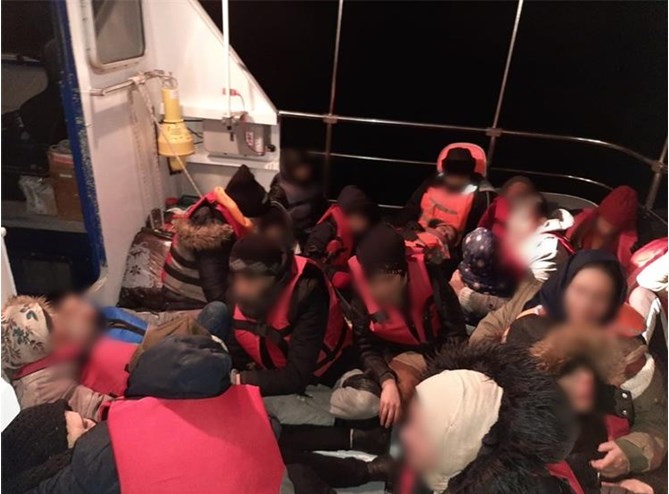
Croatia Police: Migrants on Dinghy Chilled, Dehydrated, Unconscious
"They found 36 foreign nationals on the dinghy, including five children, 11 women and 20 men. All were in poor health: chilled, dehydrated and some were unconscious. The inflatable had run out of fuel and the sea temperature where they were found was only 2 degrees Celsius. It is difficult to say what might have happened to them had they not been rescued,” the Dubrovnik-Neretva Police Department pointed out.
The migrants were transported to a police vessel where officers provided them with water, hot drinks and thermal foil to warm them, after which they were transported to the port of Alexandropolis. They were met there and put under the care of the Emergency Medical Service according to Index on February 14, 2020.
"Out of the 36 migrants, five were hospitalized, while the rest, after receiving medical assistance, were transported to a reception center following further treatment in accordance with national and European legislation," the Dubrovnik police added.
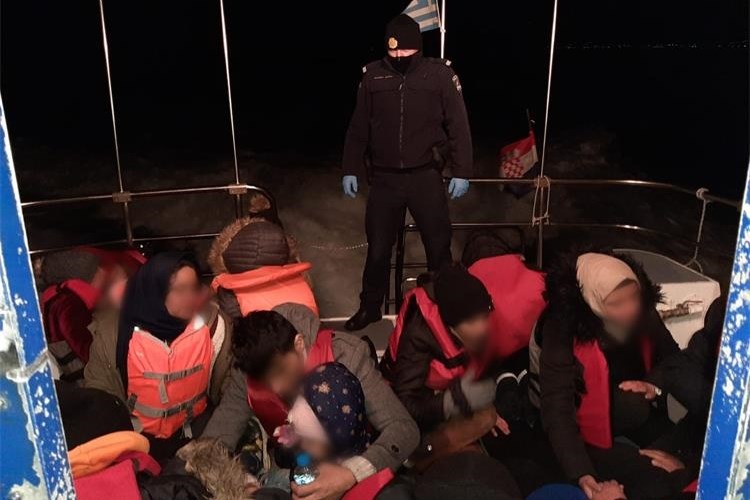
Greece Reports 60,000 Migrant Arrivals in 2019, 4,100 Arrivals in 2020
Following more than 60,000 arrivals last year, more than 4,100 refugees and migrants have reached Greek shores so far in 2020.
Recently, the Croatian parliamentary Committee on Home Affairs and National Security unanimously decided to conduct direct oversight of Croatian police work following complaints about the police treatment of migrants, Committee Chairman Ranko Ostojić (SDP) told the press after the committee meeting on February 6, 2020.
An archive of Total Croatia News coverage on the migrant crisis in Croatia can be accessed here.
Croatian and Bosnian Police to Boost Cooperation in Combating Illegal Migration
ZAGREB, February 14, 2020 - The Croatian Ministry of the Interior and police agencies from Bosnia and Herzegovina agreed at a meeting in Sarajevo on Thursday to strengthen cooperation in combating illegal migration, including better coordination and data exchange, according to a statement issued after the meeting.
"Our task is to improve cooperation in all our areas of activity on the border between Croatia and Bosnia and Herzegovina, especially after a recent meeting between the Croatian minister of the interior and the security minister of Bosnia and Herzegovina. This primarily relates to improving the readmission system and joint patrols, without the intention of Bosnia and Herzegovina becoming a hotspot for illegal migrants," the Croatian deputy chief of police, Jozo Šuker, said.
He asked the Bosnian partners for all the necessary assistance in investigating allegations of human rights violations and unlawful treatment of migrants by Croatian border police.
Bosnian border police chief Zoran Galić said that new models of cooperation were needed in addressing the growing migratory pressure on the borders of Bosnia and Herzegovina and its neighbours.
He said that last year Bosnian border police had stopped 13,251 people from entering the country illegally, but added that the police could no longer cope with the growing pressure from migrants, all the more so because one police officer guards 25 kilometres of the border.
"That's why we are doing all we can and are setting new models of cooperation to act as effectively as possible in dealing with illegal migration," Galić said.
Slobodan Ujić, the head of the Service for Foreigners' Affairs, said that Bosnia and Herzegovina honoured the readmission agreement with Croatia.
"More than 85 percent of applications sent by Croatia to Bosnia and Herzegovina have been granted," Ujić said, adding that the summary readmission procedure with Croatia was well functioning and that they were planning to use this model in cooperation with Serbia and Montenegro.
Earlier on Thursday, the government in Zagreb decided to donate police equipment to Bosnia and Herzegovina following requests by the country's authorities for assistance in tackling growing cross-border crime. Croatia will donate five thermal vision cameras and 198 sets of equipment.
Later on Thursday, Bosnia's Security Minister Fahrudin Radončić thanked Croatia for the donation, saying that it would help make the Bosnian police agencies more efficient.
More news about the migrant crisis can be found in the Politics section.
Green MEPs Claim Croatia Forcibly Returning Migrants to Bosnia
ZAGREB, February 13, 2020 - Speaking ahead of a plenary debate on the situation at the external borders of the European Union in the European Parliament on Wednesday, Green MEPs said it was unquestionable that Croatian border police were forcibly returning migrants to Bosnia and Herzegovina in violation of legal procedures.
"The only people who are insisting that illegal pushbacks are not happening in the EU’s largest external land border are the Croatian authorities," Green MEP Tineke Strik said in a report. "The UN agencies, the Croatian Ombudsman, civil society and migrants and asylum seekers we spoke to showed us clear evidence that this is happening," she added.
Last week Strik was on a fact-finding mission, along with her party colleagues Saskia Bricmont and Erik Marquardt, to Croatia's border with Bosnia and Herzegovina.
In Zagreb, they met, among others, with Interior Minister Davor Božinović, who denied their accusations. In Bosnia and Herzegovina, they visited two refugee camps at Bihać in the northwest of the country and talked to local government officials, representatives of international organisations, activists and migrants.
In their report, the Greens demand that Croatia allow independent oversight of the conduct of the Croatian border police and that the European Commission investigate allegations of human rights violations.
"People reported being beaten up by the Croatian police, being forcibly taken back to Bosnia and Herzegovina and given no information or denied access to the asylum system. Nearly 40% of the individuals pushed back are children," Strik said in the report.
"Contrary to what the Croatian Government and the European Commission say, it is evident that there is no human rights monitoring mechanism. We call on the Croatian authorities to immediately start an independent monitoring, involving the Ombudswoman and civil society organisations, on the situation at the border. The Croatian government must examine all complaints and we urge the Commission to do a thorough investigation into the allegations and take all necessary steps to ensure compliance with European rules and fundamental rights.
"The EU is pushing Croatian authorities to 'protect' their borders and keep asylum seekers and migrants out, without demanding the respect for fundamental rights. It is astonishing that despite the substantiated allegations of violent push backs, EU countries like Germany are applauding Croatia. The EU and its member states must stop turning a blind eye to this humanitarian situation at its borders," Strik said.
More news about the migrant crisis can be found in the Politics section.
Green MEPs Consider EU Members Responsible for Migrant Situation on Croatian Border
ZAGREB, February 8, 2020 - Members of a delegation of the Group of the Greens/European Free Alliance, who visited Croatia on Friday, say in an interview with Hina that all the EU member-states tacitly accept the violation of migrants' rights at the Croatian border, while Interior Minister Davor Božinović adamantly dismisses any claim about rights' breach.
The three-member delegation on Friday held talks with the Croatian minister Božinović, the public ombudswoman Lora Vidović and activists from civil society associations, and on Saturday they will visit Bosnia and Herzegovina to get an insight into the migration situation along the border between the two countries.
Erik Marquardt, a German member of the European Parliament, told Hina on Friday afternoon that all the EU member-states should be considered responsible for the developments along the Croatia border, and explained that the Green MEP delegation had not arrived in Croatia to blame the Croatian police, explaining that the situation was the result of the pressure from the whole Union.
The countries along the EU borders, including Croatia, Greece or Italy, must deal with the arrivals of migrants, and the responsibility should be shared among other EU member-states, too, however this is not yet the case, Dutch MEP Tineke Strik told Hina. She said that the current treatment of migrants was in the interest of all the EU members.
The delegation said that they had been provided with contradictory statements from the interlocutors in Zagreb. While Minister Božinović denied any case of violation of rights of migrants who are trying to pass through Croatia on their way to the western countries, ombudswoman Vidovic and the activists insisted that testimonies of people indicated violations of the rights of migrants.
Belgian Saskia Bricmont raise the question of "pushbacks" of migrants as problematic.
Minister Božinović informed the delegation that Croatia protected its border in legal way and in parallel it humanely treated all who really needed assistance.
Dismissing any accusations about violence against migrants, and reiterating that those accusations had been directed from the left-wing part of the political spectrum, he also said that the law enforcement authorities investigated every claim about possible illegal treatment of migrants.
MEP Bricmont also added that the European Union had not developed a joint policy of asylum and migrations.
In a similar vein, Minister Božinović aid that Europe had to decide on plans for those people and to remain committed to is principles of humanism and the rule of law.
"All those who give false hopes to migrants about problem-free and illegal passage to Germany, France or Italy, fail to honour the European values and actually act inhumanely, despite their declarative intentions, the Croatian minister said.
There are the 68 MEPs from the Group of Greens in the European Parliament, and they make up approximately 10% of the seats in the EP.
More news about the migrant crisis can be found in the Politics section.
Parliamentary Committee to Inspect Police Treatment of Migrants
ZAGREB, February 6, 2020 - The parliamentary Committee on Home Affairs and National Security on Thursday adopted a report on the work of the Council for the Civilian Oversight of Security and Intelligence Agencies in 2019 and the Council's 2020 work programme, and decided to conduct direct oversight of the treatment of migrants by border police.
The Committee unanimously decided to conduct direct oversight of police work following complaints about the police treatment of migrants, Committee Chairman Ranko Ostojić (SDP) told the press after the Committee meeting.
He said that oversight would most likely include Committee members inspecting police work on the ground, after which the Committee would adopt conclusions.
As for the annual report on the work of the Council for the Civilian Oversight of Security and Intelligence Agencies, Ostojić expressed his satisfaction and said that none of the cases dealt with by the Council indicated any irregularities that would have required a special session of the Committee.
He said that the Council was not denied any information from the security and intelligence agencies and that their cooperation was good.
More news about the migrant crisis can be found in the Politics section.
Bosnia Won't Become Parking Lot for Migrants, Says Minister in Zagreb
ZAGREB, February 3, 2020 - Bosnia and Herzegovina's Security Minister Fahrudin Radončić on Monday said in Zagreb that economic migration is not a humanitarian issue and that he would do everything so that Bosnia and Herzegovina does not become a parking lot for migrants.
"We have deliberately chosen Croatia for our first bilateral meeting to show that relations with Croatia are strategically important for us because we share more than one thousand kilometres of border," said Radončić who was recently appointed as the country's new Security Minister.
"Bosnia finds it exceptionally important that Croatian border is absolutely impenetrable for illegal migrants for security and other reasons," Radončić underscored.
"Not only will Croatia achieve its objectives with regard to entering the Schengen Area in that way, but it will also achieve a pragmatic position in that the route across Bosnia and Herzegovina will not be that attractive for migrants and they will bypass us," he explained.
Croatia's Interior Minister Davor Božinović agreed with his counterpart but added that it is not in anyone's interest for another or third route to exist.
"We need to come to an agreement at the EU level about the objective and intention with regard to economic migrations," Božinović added.
"Solidarity of everyone in Bosnia and Herzegovina and the region is necessary. If the EU and we do not come to an agreement, there will be problems. I will do everything for Bosnia and Herzegovina to not become a parking lot for migrants," Radončić underlined and called on Brussels to not treat the migrant crisis merely as a humanitarian issue but one of security too.
He added that 93% of EU support for Bosnia and Herzegovina is used for humanitarian aid and only 7% is allocated for security issues.
Božinović said that he and his counterpart had agreed to stronger cooperation between border police while Radončić warned of the "alarming situation," in his country in that regard.
"Each border police officer patrols 25 kilometres of the border. In the past three years, there has not been one new police officer employed in the border police," Radončić stressed and added that the country urgently needs 400 police officers and in the long run 1,200.
Božinović said that today almost all security issues are transnational and that cross-border cooperation is essential.
He underlined that last year Croatia arrested a thousand smugglers and added that this is "one of the fastest growing forms of organised crime in these regions."
"We have already arrested 95 people since the beginning of the year. That is certainly one area where cooperation has to be additionally strengthened with the relevant services in Bosnia and Herzegovina and also elsewhere," Božinović added.
In the end, Radončić thanked Croatia for its support to Bosnia and Herzegovina and invited Božinović for a visit.
More news about migrant crisis can be found in the Politics section.
Božinović Rejects Accusations Against Croatian Police over Treatment of Migrants
ZAGREB, January 28, 2020 - Croatian Minister of the Interior Davor Božinović in Brussels on Monday dismissed accusations levelled against Croatian border police over their treatment of migrants, saying there was no evidence to support the claims made by members of the European Parliament.
Božinović and Justice Minister Dražen Bošnjaković outlined the priorities of the Croatian EU presidency in their respective departments before the European Parliament's Committee on Civil Liberties, Justice and Home Affairs.
Most of the remarks made by Committee members concerned the treatment of migrants by the Croatian border police. Several of them showed photographs of adults and children with bruises and injuries suffered at the hands of the Croatian police.
Cornelia Ernst of the German Left Party showed a photograph of a man claiming to have been bitten by a police dog. She said that the man had begged the police to stop the dog and that the police had eventually applauded to the dog.
Several MEPs said they had been told by migrants that the police had used stun guns against them.
"Police dogs must wear muzzles, and as for stun guns, Croatian police don't have them at all. These are false accusations," Božinović replied.
He said that migrants who are trying to enter Croatia illegally do not carry any documents with them. "If someone needs international protection, why would they hide their identity?" he asked.
Božinović said that Croatia was facing a large number of migrants trying to cross its border illegally. He said that those people were now mostly economic migrants and to a lesser extent refugees, who he said were the most numerous at the height of the refugee crisis in 2015 and 2016.
"Those people are trying to reach wealthy western member states. We have the longest land border, and the other two member states with which we share the border have put up razor-wire fencing. We have to deal, on a daily basis, with people who don't want to stay in Croatia but want to go to western member states which are reluctant to take them in. If they were willing to accept them, we might be able to help, but I haven't heard that anyone wants to take them in. Instead, you blame the Croatian police, but I assure you that you won't find evidence to support your claims," Božinović said.
He noted that this was not a small group but hundreds of thousands or millions of people on the move in search of a better life in the west.
"I sympathise with people who want a better life for themselves, but we in the EU must agree what to do with them, because we are talking about millions of people," the Croatian minister said.
Responding to accusations of violent pushbacks of migrants by the Croatian police, Božinović said that Croatian police act in line with Croatian and European law. "None of the statements about the allegedly improper conduct of the Croatian police was made in Croatia, they were all made in Bosnia and Herzegovina or Serbia and without any evidence or at least approximate information as to where and when (such incidents) occurred," he added.
"Europe must take a stand on migration as one of the key issues for the future of the European project. We are not talking about small groups of people, but about hundreds of thousands and millions. We must start differentiating between things, that those who need international protection get it and those who want to live in the west can do so and that's legitimate, but no one has the obligation to make that possible for them," Božinović told the press after the debate in the European Parliament.
More news about the migrant crisis can be found in the Politics section.
Croatia Border Patrol Tracking Migrants With Portable Thermal Imaging
During the 2015 migrant crisis, Hungary and Slovenia built border barriers to thwart the influx of illegal migrants. Until recently, Croatia border guards have faced the daunting task of manually monitoring their unfenced 1,326 km border, which is also a non-Schengen EU border. However, with the help of advanced thermal imaging technology, Croatian border guards have finally gained an edge on stopping illegal migrant movement.
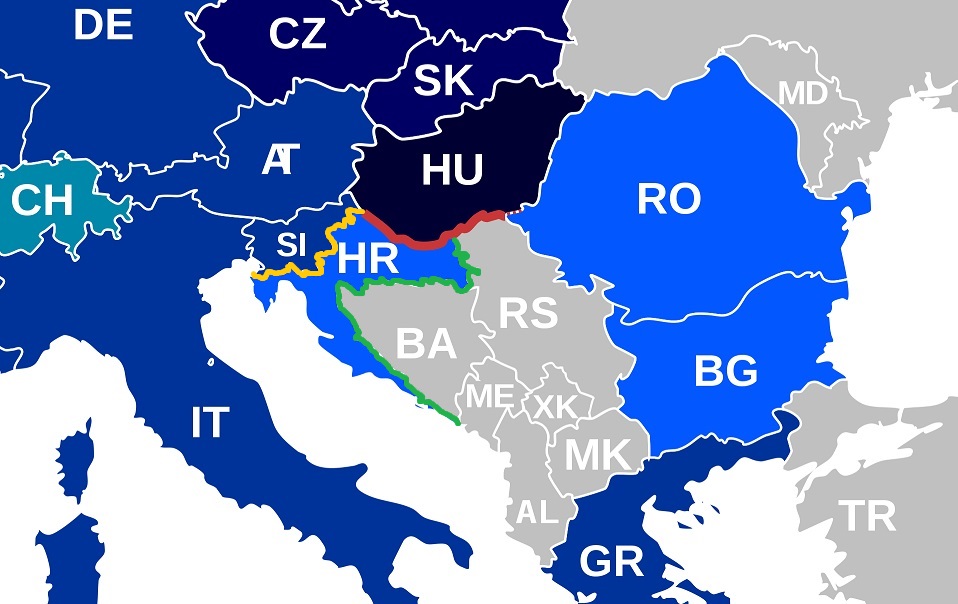
Hungary Border Fence (Red) | Slovenia Border Fence (Gold) | Croatia Border No Fence (Green) | Wikipedia
Unfenced Croatia EU Border 1,326 Kilometers Long
The Hungarian border barrier, which spans the borders of Serbia and Croatia, is 523 km long. The Slovenian border with Croatia spans 670 km. By contrast, Croatia shares a combined 1,326 km unfenced border with Bosnia and Serbia (1009 km with Bosnia, 317 km with Serbia). And migrants, many of whom are biding their time in nearby border camps, make repeated and daily attempts to enter Croatia from both countries, a practice which they call "The Game".
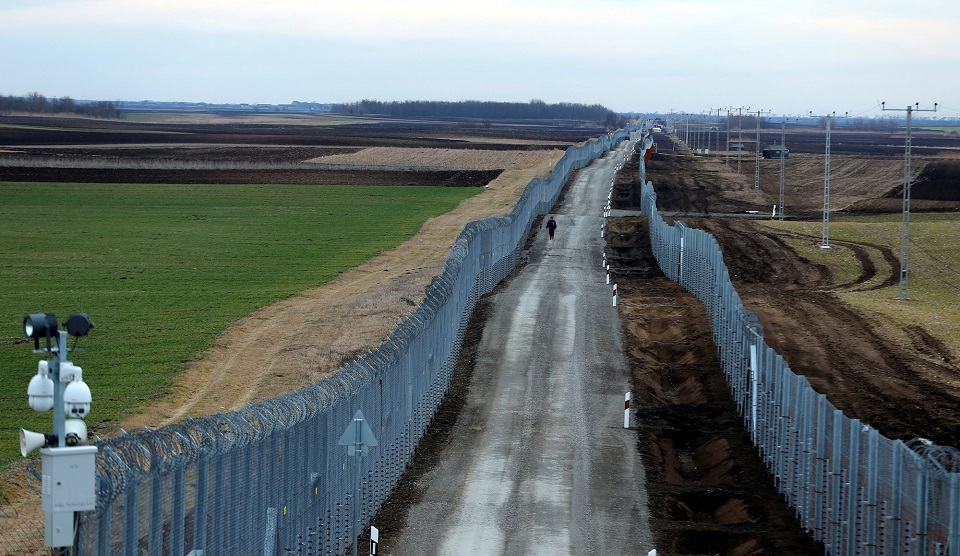
Hungary Border Fence | Wikimedia Commons
Electrified Hungarian Border Barrier Stopped Illegal Migration
Once completed in 2015, the Hungarian border barrier effectively halted migration into that country. It is equipped with parallel barbed-wire fences, floodlights, security cameras, and loudspeakers which blare warnings in English, Arabic and Farsi. The fences also deliver a mild electric shock upon contact, and have rendered any potential accusations of migrant pushbacks a moot point.
The Slovenian border barrier, while not as advanced, has also deterred attempts by migrants to enter Croatia’s Northwest neighbor. Both fences have effectively left many migrants, who are seeking entry into the Schengen zone, stranded in Croatia. While trapped in Croatia, they work with smugglers or attempt to continue their journey to Italy, Germany and France on their own.
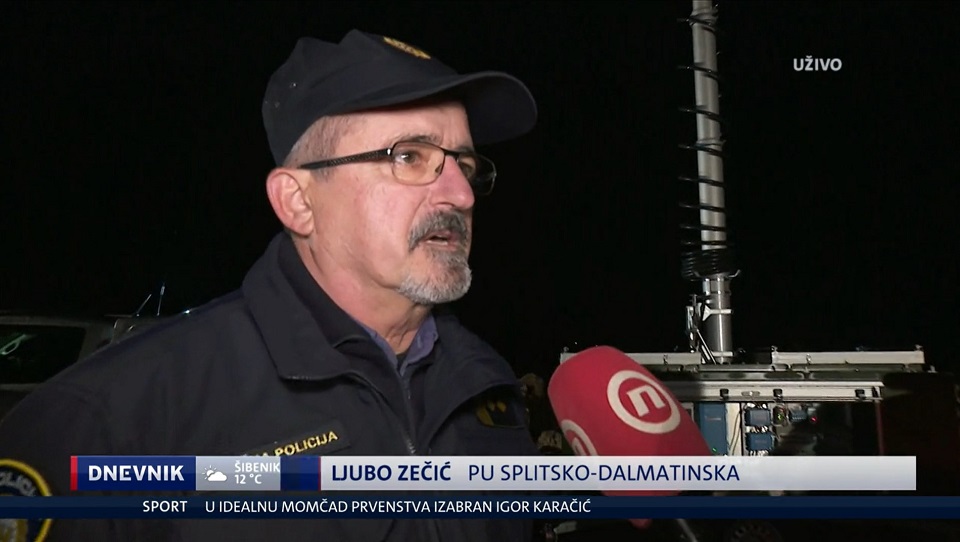
Croatia Begins Using Mobile Thermal Imaging Cameras
The Croatian border is now being protected by mobile thermal imaging cameras which can detect people illegally trying to enter Croatia from up to distance of several kilometers. The Nova TV/Dnevnik news team went to the border on January 26, 2020 and was the first to see how the 6 million EUR system works in practice.
Croatian police departments located on the illegal migrant route and roads leading to Croatia have been equipped with 17 Flir mobile camera systems.
Ljubo Zečić of the Splitsko Dalmatinska County Police Administration said that there are two devices are in their jurisdiction and indicated that it is very helpful that the system is mobile and can be easily transferred to positions which have been detected as frequent crossings.
Most Migrants Enter Croatia From Sarajevo and Mostar
"Most migrants coming from Bosnia are attempting to enter Splitsko Dalmatinska County from Sarajevo and Mostar. In 2019, our police department reported a 30 percent increase in illegal migrants and a 54 percent increase in smugglers," Zečić said.
Tomislav Poljak from the Trilj station demonstates the Flir thermal imaging device, which has already thwarted the plans of numerous migrants and smugglers to enter Croatia illegally.
"Our colleagues are walking about two and a half kilometers from us, and we can detect exactly what is happening at that distance with this device," explains Poljak.
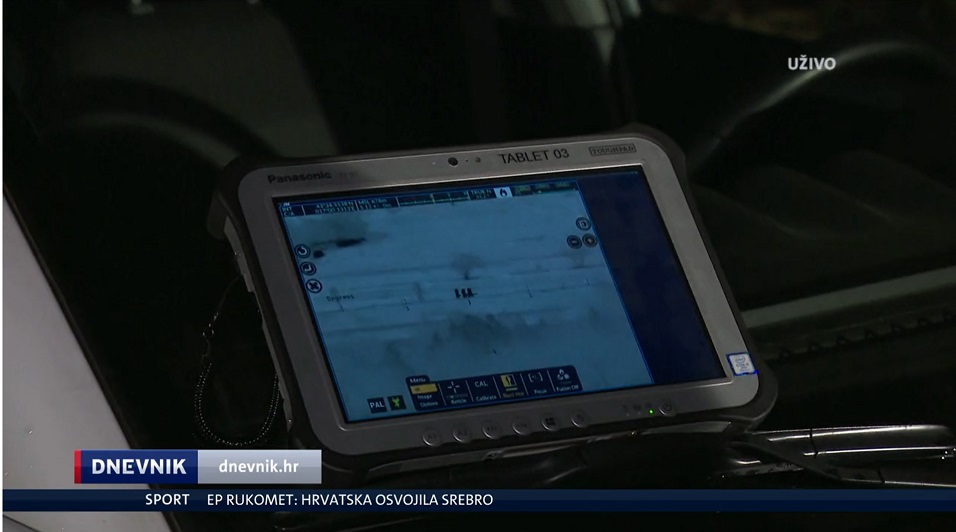
Migrant Cell Phones Permit Communication and Coordination
As soon as Tomislav's work shift began, he noticed some suspicious activity on the border. It was likely that someone was attempting to enter Croatia on a gravel road, which is often used by migrants going to Sinj. The nearest border control team was immediately dispatched to the field.
"A lot of migrants have very good cell phones and are quite well informed. And nowadays, they use temporary sim cards with these cell phones. They always have another trick up their sleeves,” Tomislav points out.
Cameras Detect Migrant Movement Across Bosnia Border
Almost a kilometer above sea level, the police officers found an abandoned truck which migrants often us to seek shelter from bad weather. Since there was no one in the truck, the Trilj border guards continued their search with manual thermal imaging devices.
"Without this technology, it would be much harder to do our job because you cannot see anything in the dark with human eyes," Zdenko explains.
The police action was soon abandoned because the suspect returned to Bosnia and Herzegovina.
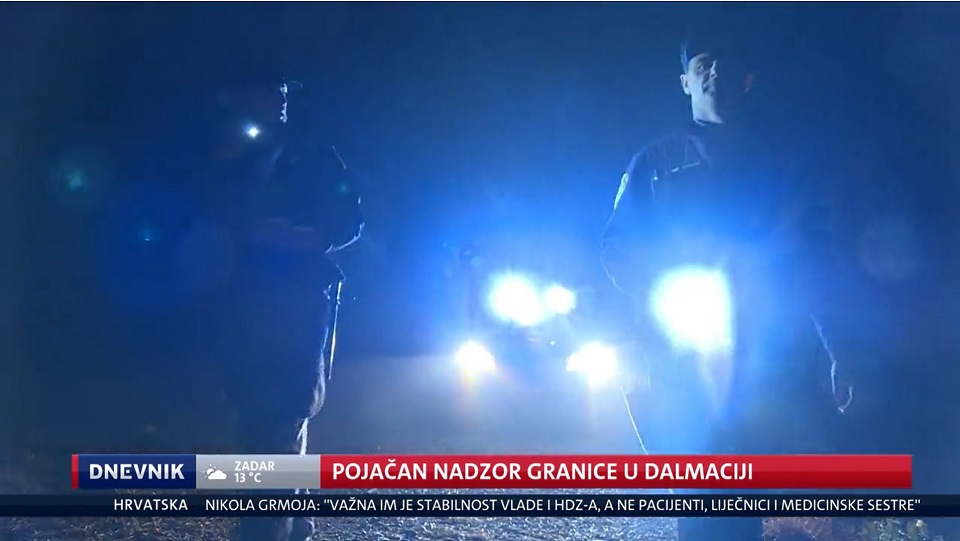
Cameras Can Be Moved Within 20 Minutes
The benefits of these devices are numerous. "If we need to move it to another location quickly, it takes us maybe 15-20 minutes to pack it up and drop it off," Tomislav says.
The cost of one Flir thermal imaging camera is almost 2.7 million HRK (362,789 EUR). If you approach it; the device automatically notifies police officers on the ground and issues a verbal warning. With the help of this technology, police believe that they will finally be able to stay a step ahead of smugglers and people trying to enter Croatia illegally.
Follow our Politics page to keep track of the migrant crisis in Croatia and efforts to control illegal border movement.


